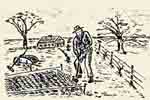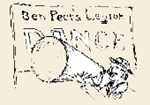

 |
 |
| Home | Index | Museums | Blog | Authors | Site Map | About |
|
A WordTo Give, Take, KeepbyStephen S. LewandowskiWhen I was first elected to office, the municipal attorney sent me a letter of official business, and I saw with shock that it was addressed to "The Honorable." It hadn't occurred to me that the simple matter of running for office and being elected would confer any such titles. Many of my friends seemed to imply the opposite. As I thought about it more, though, it seemed there was a point to the honorific: in running for election, I had spoken about the need to protect the public trust. In voting for me, the public had conferred that trust, and in taking the oath of office, I had given my word that I would not only protect the community's health, safety and general welfare but that I would do so within a framework of state and federal laws. At first blush, though, I wondered what I had got myself into. Local historian Sheldon Fisher's passing has reminded me to review the position he held, without virtue of election, as an exemplary man-of-honor in the community. In his case, it was his faithfulness to history, right down to the details, that attracted first my attention then my trust and admiration. He spent his ninety-five years pursuing interests in local history, Native Americans, and genealogy and being the catalyst for groups of similar-minded aficionados. Sheldon also exemplified for me the virtues of staying at home, which he accomplished to a remarkable extent. He was after all a Fisher, born in Fishers, New York, of generations of Fishers, and the tiny hamlet of Fishers always remained the heart of his universe. Sheldon knew that any inquiry had to be located somewhere, some point of origin and perspective, and he found Fishers to be as good as any and better than most for him. He found, as well, that tiny events in Fishers might very well be vitally connected to massive, world-shaking events elsewhere on the globe. For example, we know the Mormons began in Upstate New York before embarking on their epic cross-continent journey. Sheldon's research uncovered significant details of the religion's origins among families living in a swath from Palmyra to Mendon, including, yes, Fishers. Sheldon lived a life of inquiry and imagination which saw, as Blake said, "the world in a grain of sand." Fishers was his grain of sand. As a young man in the 60s, I remember seeing Sheldon and Herb Ellis, two old men then, gathered in a downpour of rain and sleet at the Council Stone on the main street of my hometown. They were observing the anniversary of a treaty signed in 1794 by representatives of two local authorities. One group was the Seneca Nation who gained their authority by identifying features of the local landscape as their place of origin. But in 1794, their long residency was drawing to a close, and they were on their way to reservations, to Canada, across the continent, bound elsewhere. The other authority was the new United States, only a few years away from having won independence from the world's premier colonial power, represented by a hatchet-faced commissioner with a reputation for hard and fair dealing. The weather on the day the Treaty was signed wasn't recorded, but it's not too difficult to imagine it as a similarly bleak, cold, gray November day with a hint of snow in the air. My hometown was a frontier settlement of a couple hundred people huddled around their chimneys. Sheldon Fisher is worthy of honor because, despite the actions of our government in the 1960s to appropriate some of the remaining Seneca land for a dam project, he insisted on honoring the treaty. He felt as though it was his word that was given on November 11, 1794, and he would honor his word, whatever else others did. We should all try to have such a WORD. The Seneca stayed away from the commemoration, regarding the U. S. action as bending if not breaking the treaty and hoping in vain to embarrass the U. S. Having a word requires that we give it without conditions and with as full a knowledge of consequences as possible. A word isn't a word when we assign conditions to it: "I'll keep my promise if/when you do." Likewise, having a true word to give requires that we live with all its consequences. I'm reminded of our friends the Friends who, when they were branded as Quakers, remarked mildly, "Why yes, we do quake in the presence of the Lord," and accepted the name as a legitimate, secondary title for their church. In their early days, they were constantly in trouble with religious and secular authorities for what they would and would not do. One of the bones of contention was the swearing of oaths. The Quakers would not swear to the truth of anything, they considered that once having spoken the truth and said their "word," that no amount of attestation, declaration, God's witness or man's notarization would alter that word of truth. Swearing to the truth of a true statement was in effect gilding the lily, and they would no more swear than they would wear gaudy clothes (they insisted that bright dyes were intended to hide the dirt, and they preferred plain, clean clothes). For authority, they pointed to a passage in the Matthew's Gospel where Jesus remarked, "Let your yea be yea and your nay be nay." The world is full of conflicting allegiances, multiple perspectives, and contrary interpretations. There can be every shade of gray and confusion on all sides about the shades. We employ specialists to spread the confusion to gain an advantage. The exponential growth of the attorney and actuary populations supported by our society attests to the sharpness of the instruments now being used to split hairs. Written contracts and treaties stretch into multiple volumes in which every circumstance and condition is imagined, explicated, dissected and allocated. By contrast, most of Sheldon Fisher's lifetime business was done as a matter of word, with perhaps a handshake thrown in for good measure. Perhaps part of our current problem is our hyper-literacy. We expect that everyone we encounter will also be literate, and that the records of decisions will be written down and kept so that they can be consulted in the future when the parties have forgotten the details of their agreement or have passed the agreement on to new parties. But not everyone is literate now, nor were they in the past. In part, the collision of the Seneca and the United States was part of a long history of literate people trying to impose their idea of an agreement on people whose idea of their word was quite different. Clearly the Iroquois believed in reaching agreements with others (the Iroquois "League" was formed by such a device), and records of agreements were kept with wampum belts. The wampum belts functioned as mnemonic devices to facilitate the recitation of agreements in public. The other party to the Canandaigua Treaty recorded words on paper (even if the Seneca signers could only make a "x"), copied the papers, then hid their copy in a vault in a distant capital. Our memories seem to have atrophied just as the clauses have multiplied. In the matter of giving, taking or keeping a word, some believe it matters who knows, remembers, and keeps track; others do not. Some believe that a word given is a public matter and others that it is a private function. I think that the function of a word has private and public aspects. The public aspects are easiest to describe. On our side, giving and taking a word in public usually involves a ceremony, and the ceremony invokes some sacred principle to witness and protect the word. On the other hand, the Seneca have consistently used metaphorical but secular imagery, speaking of the Canandaigua Treaty as a chain, with full knowledge that the way a chain binds can be assuring, or painful. The chain they speak of could be decorative since it's made of silver. Left unattended, the chain binding the parties could become tarnished and ugly. The Seneca insist that the chain, binding the two people together in friendship, must be periodically taken out, inspected and polished, so that it will continue to be an ornamental thing of beauty and not a tarnished hindrance. The Seneca's meaning isn't obscure: the word needs to be exercised in public. It reminds me of a Jewish tale about the angel that attends every friendship. Without friendship's proper exercise, the angel dies, so friends are required to see one another, to speak and to share. It matters less what they do so long as they do something together as friends. The private word is more difficult to describe because it has an inchoate aspect going beyond language's ability to express and moving toward plain action. A person may give his word to him or herself, without notifying any other party. Probably we all know someone who's dedicated to a task for a reason not immediately apparent. For example, a person may undertake work simply because that project was the unfulfilled wish or goal of a friend who's been unable to follow it through, through sickness or death. The word may also bind two people, and marriage is the best known example. In fact, the most common ceremonies of marriage invoke conditions and exceptions, "in sickness and in health," only in order to nullify them. Beyond marriage, a word may be given within a family, extending common allegiance and protection to all of that blood. Beyond the family, most word-giving and -taking becomes a public ceremony with attendant ritualism. Perhaps a better question about the nature of the word is how it is distributed—how far it reaches and who may make a claim on it. Exemplary people of honor often extend the circle in which their word will be kept beyond their families, friends and associates, beyond their clans and tribes, and even beyond "people like us," to include all humanity, the whole creation. Sheldon Fisher's circle of responsibility had a center in Fishers, New York, not a place we, or he, might have chosen. But from that center, the circle extended to include all sorts of unlikely people and places and, most strikingly, deep into history and far into times to come. © 2003, Stephen S. LewandowskiIndex to articles by Stephen LewandowskiCLR Blog | Site Map | Contact CLR |